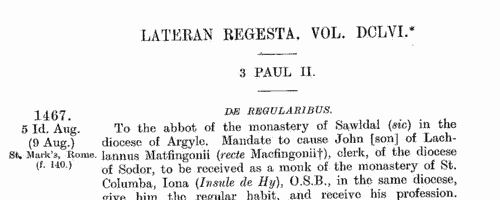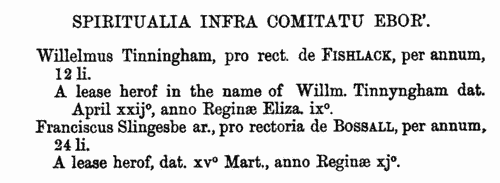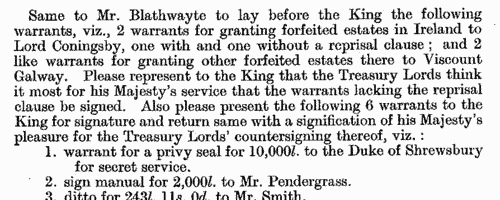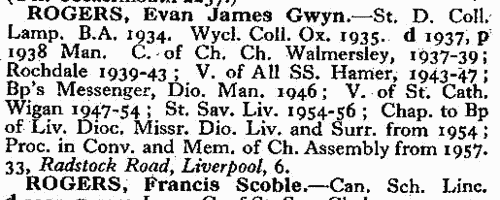Kaa Surname Ancestry ResultsOur indexes 1000-1999 include entries for the spelling 'kaa'. In the period you have requested, we have the following 9 records (displaying 1 to 9): Buy all | | | Get all 9 records to view, to save and print for £36.00 |
These sample scans are from the original record. You will get scans of the full pages or articles where the surname you searched for has been found. Your web browser may prevent the sample windows from opening; in this case please change your browser settings to allow pop-up windows from this site. Close Rolls
(1302-1307)
The close rolls of the 31st to 35th years of the reign of king Edward I, that is to the day of his death (7 July 1307), record the main artery of government administration in England, the orders sent out day by day to individual officers, especially sheriffs of shires: they are an exceptionally rich source for so early a period. In amongst this official material, the rolls were also used as a way of recording many acknowledgments of private debts and contracts between individuals. Most of the contents relate to England, but there are also entries concerning Wales, Scotland, Ireland and the English possessions in France.KAA. Cost: £4.00.  | Sample scan, click to enlarge

| Inhabitants of Yorkshire: Claro wapentake
(1379)
The poll tax returns for this wapentake, the area around Aldborough, Boroughbridge, Knaresborough and Wetherby.KAA. Cost: £6.00.  | Sample scan, click to enlarge

| Court rolls of manors held by Durham priory
(1296-1384)
The cathedral priory of Benedictines (black monks) of St Cuthbert at Durham possessed many manors in the county. These were administered by halmotes, or manor courts, held in three sessions (tourns or turns) each year (here marked I., II. and III.), before the terrar (obedientiary), steward, bursar, and/or the prior himself. The court rolls recording proceedings in these courts survive from 1296, 1300, 1309, and from 1333, but with years missing, until becoming fairly continuous from 1365 onwards. Extracts from the rolls from 1296 to 1384 were edited by John Booth and published by the Surtees Society in 1886. The manors under this jurisdiction were Aycliffe, Bellasis, (Newton) Bewley, Billingham, Burdun, Chilton, Coupon, Dalton, Edmondbyers, Ferry (Hill, or Ferrycliffe), Fulwell, Harton, Hebburn, Hedworth, Hesledon, Heworth, Jarrow, Kirk Merrington, East Merrington, West Merrington and Mid Merrington, Monkton, Moorsley, Newton Ketton, Nunstanton, North and South Pittington, East and West Rainton, Ravensflat, Shields, Southwick, Spen, Usworth, Wallsend, Wardley, Wearmouth, Westoe, Willington and Wolviston. The main contents of the records are demises of land held by the bond tenants, neifs, cotmen and others, and of the demesne lands; and bye-laws and pains (penalties) for breach of these; and other minor delinquencies.
Normally, when a farm, cottage or piece of land was let to a new tenant, the name of the last tenant is also given, as well as the amount of the rent, and the amount of the gersum (fine on entry). These court rolls contain some of the only surviving evidence for the inhabitants of these townships in this period: but this publication was of extracts, and was not comprehensive. It should also be noted that the third tourn each year (III.) usually took place in January to March, and so by modern dating in the following year. Thus, the third tourn of 1296 was held on 4 March 1297.KAA. Cost: £4.00.  | Sample scan, click to enlarge

| Clergy, the religious and the faithful in Britain and Ireland
(1458-1471)
These are abstracts of the entries relating to Great Britain and Ireland from the Lateran and Vatican Regesta of popes Pius II and Paul II. Many of these entries relate to clerical appointments and disputes, but there are also indults to devout laymen and women for portable altars, remission of sins, &c. This source is particularly valuable for Ireland, for which many of the key government records of this period are lost. Many of the names in the text were clearly a puzzle to the scribes in Rome, and spelling of British and Irish placenames and surnames is chaotic.KAA. Cost: £4.00.  | Sample scan, click to enlarge

| Tradesmen of York
(1272-1558)
No man or woman could trade in the city of York without having obtained 'freedom' of the city.Their names were recorded on the 'Freemen's Roll', or Register of the Freemen of the City of York, which contains about 19,900 names for this period. A list of names was prepared for each year, the year being here reckoned as starting at Michaelmas (29 September) until 1373, and thence at Candlemas (2 February). Each annual list starts with the name of the mayor and the camerarii or chamberlains. The chamberlains were freemen charged with the duty of receiving the fees of the new freemen; of seeing that only freemen traded in the city; and of preparing this roll, which was compiled from the names on their own account books from the receipts for the fees. There are three groups of freemen: those who obtained freedom after serving out an apprenticeship to a freeman; the children of freemen; and those who claimed freedom by 'redemption', i. e. by purchase or gift from the Mayor and Court of Aldermen.
KAA. Cost: £2.00.  | Sample scan, click to enlarge

| Tenants of the Bishop of Durham
(1580)
'A Booke of Surveighe and an Abstract out of the Rentale of all the Landes, Tenementes and Revenews that belonge to the Cathedrall' Churche of Durism' with the perfect and perticuler State therof, mayd anno Reginae Elizabethae vicissimo secundo, 1580' was edited by John Booth and printed by the Surtees Society in 1886. The bishopric had an extensive rental in the city and county of Durham; eight places in Northumberland are mentioned; and then there are glebe rentals from rectories in county Durham and Northumberland in the bishop's hands. Greater detail is then given of the tenants of the manors in county Durham held as of the cathedral priory - Aycliffe, Bellasis, (Newton) Bewley, Billingham, Burdun, Chilton, Coupon, Dalton, Edmondbyers, Ferry (Hill, or Ferrycliffe), Fulwell, Harton, Hebburn, Hedworth, Hesledon, Heworth, Jarrow, Kirk Merrington, East Merrington, West Merrington and Mid Merrington, Monkton, Moorsley, Newton Ketton, Nunstanton, North and South Pittington, East and West Rainton, Ravensflat, Shields, Southwick, Spen, Usworth, Wallsend, Wardley, Wearmouth, Westoe, Willington and Wolviston. Finally, there is a list of new leases granted out at lotteries by the late dean of Durham and the prebendaries there; fines received but not yet paid into the cathedral funds; and the names of tenants (of the priory) claiming tenant right and refusing to take leases.KAA. Cost: £4.00.  | Sample scan, click to enlarge

| Treasury Books
(1696)
Records of the Treasury administration in Britain, America and the colonies, from April to September 1696. These also include records of the appointment and replacement of customs officers such as tide waiters and surveyors.KAA. Cost: £4.00.  | Sample scan, click to enlarge

| Treasury Books
(1713)
Records of the Treasury administration in Britain, America and the colonies, for 1713. Also includes Queen Anne's Civil List (royal expenditure) Lottery papers: payment of the royal servants had fallen two years in arrear: Parliament passed an Act allowing the queen to raise half a million pounds by pledging 32 years' future income: she did this by means of a lottery.
KAA. Cost: £4.00.  | Sample scan, click to enlarge

| Anglican clergy
(1957)
Crockford's Clerical Directory listed all Anglican clergy in the British Isles, India, Africa, Canada, the West Indies, Europe, Australasia and South America. The 77th issue, for 1957-58, is based on returns from all the individuals listed, and was deemed correct as of 30 September 1957. The details given are: name (surname first, in capitals) in bold; name of theological college and/or university, and degrees, with years; a bold d followed by year and diocese signifies date of ordination as deacon and by which bishop; then a bold p, similarly for ordination as priest; posts (C: curate; I: incumbent; V; vicar; R: rector) with parishes and years; address; telephone number; and lists of books &c. where appropriate. In the case of the man then holding an English, Irish, Scottish or Welsh benefice, additional details are given - a bold P signifies the patron of the advowson; then the income, with items such as Q. A. B. (Queen Anne's Bounty), Eccles(iastical) Comm(issioners), Fees, e. o. (Easter Offerings), Pew Rents, T(ithe) R(ent) C(harge), Gl(ebe), &c.KAA. Cost: £4.00.  | Sample scan, click to enlarge

|
Research your ancestry, family history, genealogy and one-name study by direct access to original records and archives indexed by surname.
|











